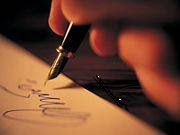

Verisimilitude is a word that comes from the world of writing fiction. It emerged with the onset of fiction as a popular form of literature, causing some consternation among literary critics. Is the story meant to be true, or is it imaginary? How is the reader to know? What if the reader doesn't understand that it is not a true story? Each of these questions puts the responsibility on the author to acknowledge the truth or lack of truth in the story.
As popular fiction emerged in literature, the onus for determining the mindset of the story shifted more and more to the reader. In contemporary literature that is the understanding: the reader is to utilize his or her skills in sorting through the veracity of the story. The suspension of disbelief on the part of the reader became a function of verisimilitude, the ability of the author to create a reality base by which the reader can allow the suspension of disbelief in order to capture the essence of the plot without difficulty.
It is increasingly difficult to sort out the fictional aspects of writing from the factual reporting as the use of fantasy in literature explodes. The recent literary phenomenon, Harry Potter, is a prime example of the diminishing border between fantasy and truth. Verisimilitude is rampant, as fact and fantasy are woven skillfully by the author, JK Rowling. Her application of verisimilitude techniques establishes a reality base upon which the readers (particularly children) can allow their imaginations to soar, all the while accepting the reality of Harry and his friends.
In the 21st century the employment of verisimilitude is not simply a literary technique. It is also a journalistic technique. The clever utilization of fact, fiction, fantasy and fabrication (how about that for alliteration?) in journalism and commentary lead to confusion by the public about truth.
We are told that the young adult population of the United States is dependent upon the clever weaving of these factors, in humor, for its access to current news and events. My perception is that Generations X, Y and Z (if there is such a thing!) are skilled far more than my War Baby generation and the Boomers. Today's youth are bred upon a kind of literature (written, aural, and visual) which allows them to filter through the humor of Jon Stewart and The Daily Show in order to siphon the news as Stewart reports it. The onus on public figures is to be aware of the significance of this medium and treat it with the same respect as they might the 6:30 national news.
Verisimilitude has much to do with the appearance of reality in the midst of fiction. Thus, there is a pressure on those utilizing new methods of communication to employ verisimilitude in a moral and ethical manner. I'm not sure the rules for this have emerged clearly. 24 hour talk radio and TV, cable television, and easy access to the publishing field create a literary atmosphere which is rapid, sometimes clumsy, and often malicious. Verisimilitude as a literary technique is sometimes lacking.

No comments:
Post a Comment